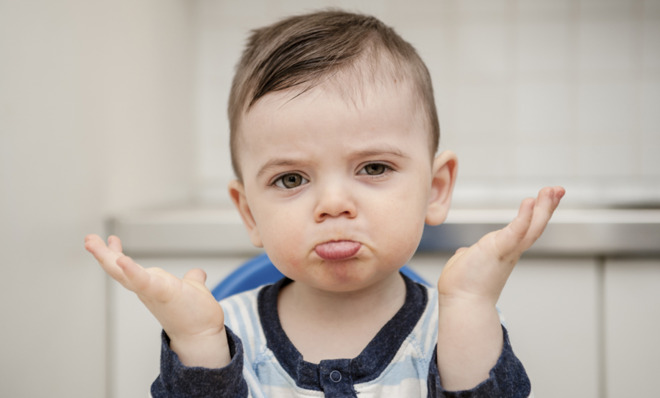These 11 countries are banning certain baby names because parents can't be trusted
"Mafia No Fear," "Anus," and... "Linda"?

A free daily email with the biggest news stories of the day – and the best features from TheWeek.com
You are now subscribed
Your newsletter sign-up was successful

Well you can no longer name your kid "Linda" in Saudi Arabia. So there's that.
"Linda" is one of 50 names now banned in the country as of this month, according to Gulf News.
Other banned names include: Alice, Lauren, Malika (queen) and Jibreel (Gabriel). What do these names have in common?
The Week
Escape your echo chamber. Get the facts behind the news, plus analysis from multiple perspectives.

Sign up for The Week's Free Newsletters
From our morning news briefing to a weekly Good News Newsletter, get the best of The Week delivered directly to your inbox.
From our morning news briefing to a weekly Good News Newsletter, get the best of The Week delivered directly to your inbox.
The interior ministry finds them offensive in one of three ways:
Those that offend perceived religious sensibilities, those that are affiliated to royalty and those that are of non-Arabic or non-Islamic origin.
So long, Sandy of Saudi Arabia. It's been nice knowing you. Here's the full list of Saudi Arabia's banned names. And here are 10 more countries that find it necessary to call the shots when it comes to that fateful day:
1. New Zealand
The official list of rejected names in New Zealand includes "4Real," "Mafia No Fear" and "Anal." Other gems — like "." and "*" — didn't even bother with the alphabet. All of the names on the list were at some point proposed by parents, soon to be rejected by the government, which deemed the names too offensive.
A free daily email with the biggest news stories of the day – and the best features from TheWeek.com
2. Germany
In Germany, you must be able to tell the gender of the child by the first name. "Matti," for instance, was rejected. The name also must not be considered to have a negative impact on the child's well being. An office of vital statistics, called the Standesamt, decides whether or not a name is OK. They have nixed "Stompie," and "Woodstock" as well as last names like "Kohl." "Osama bin Laden"? Not so much.
3. Portugal
Portugal has an 80-page document outlining which names are acceptable and which aren't. For a long time, only biblical or Christian names were allowed. "Nirvana," "Olaf," and "Kennedy" didn't make the cut.
4. Denmark
Denmark has a list of 7,000 pre-approved names. "Anus," "Monkey," and "Pluto" are not on it.
5. Norway
Norway's strict naming law dates from the 1800s, and is intended to protect children from names that sound or look strange, according to the AP. Acceptable names include "Dits," "Fridvall," "Glisur," "Glasius," "Wrold," "Anond," "Raabi," and "Skagj." "Gesher," not so much. A woman actually wound up in jail for two days because she refused to change her child's name from "Gesher" to something else. "Gesher," which is Hebrew for "bridge," came to her in a dream, she said.
6. Sweden
Sweden has thwarted attempts by its citizens to name their kids "Superman," "Metallica," and the roll-off-your-tongue "Brfxxccxxmnpcccclllmmnprxvclmnckssqlbb11116."
7. Morocco
In Morocco, there is a list of approved names that appropriately reflect "Moroccan identity." You can name a baby "Sara" (Arabic version) but not "Sarah," (Hebrew version).
8. Japan
In Japan, only official kanji may be used in babies' given names. The purpose is to make sure all names can be easily read and written by the Japanese. The Japanese also restrict names that might be deemed inappropriate. So there is no more "Akuma," meaning "devil," in case you were wondering.
9. Malaysia
Malaysia tightened up its naming law in 2006 in order to prevent such atrocities as "Hitler," "smelly dog," and "007." Malays can't name their kids "Woti," which means "sexual intercourse," nor can they name their kids after animals, insects, fruits, vegetables, or colors.
10. Iceland
In Iceland, baby names are supposed to fit Icelandic grammar and pronunciation rules — choices like Carolina and Christa are not allowed because the letter "c" is not part of Iceland's alphabet. In January 2013, a 15-year-old girl named "Blaer" won the right to keep her name, which she had been told by authorities wasn't feminine enough.
This article, by Emily Lodish, originally appeared at GlobalPost.
More from GlobalPost...
-
 The 9 best steroid-free players who should be in the Baseball Hall of Fame
The 9 best steroid-free players who should be in the Baseball Hall of Famein depth These athletes’ exploits were both real and spectacular
-
 ‘Bad Bunny’s music feels inclusive and exclusive at the same time’
‘Bad Bunny’s music feels inclusive and exclusive at the same time’Instant Opinion Opinion, comment and editorials of the day
-
 What to watch on TV this February
What to watch on TV this Februarythe week recommends An animated lawyers show, a post-apocalyptic family reunion and a revival of an early aughts comedy classic